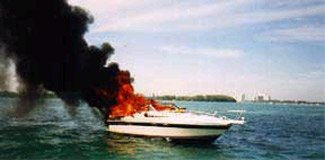Advertisement

In shopping for replacement parts for your boat's engine, you may discover an annoying price difference between "marine" parts and common automotive parts. The difference is due to small but important modifications.
Starters, alternators, distributors, starter solenoids, and all electrical motors should be ignition protected if they are intended for marine use. This means they are sealed to contain sparks, which are produced in normal use. Sparks under the hood of your car are not a hazard, since a constant draft prevents an accumulation of flammable vapors. In the confined spaces of your boat's bilge, however, one spark plus an accumulation of gasoline fumes can mean disaster. Some automotive carburetors and fuel pumps are designed to leak. They have vents, which emit small amounts of gasoline if a carburetor float chamber overflows or a fuel pump develops an internal leak. With cars, gas drips out of the car. On marine carburetors, these vents lead into the carburetor throat so that any overflow is consumed by the engine. Marine fuel pumps eliminate external leaks.
Shop the best price, but make sure the unit you buy is marked "Marine" or "Ignition Protected." The following standards have made it a lot easier to buy safe marine equipment for your boat. By using any of these names, a manufacturer is stating that its products have either been produced following these standards or have been tested to meet them. Look for any of the following in the descriptions of products in this catalog.
Underwriters Laboratory Listing
This is one of the most common Underwriter Laboratory's marks. If a product carries this mark, it means UL found that inspected samples of this product met UL's safety requirements. These requirements are primarily based on UL's own published Standards for Safety.
Underwriters Laboratory Marine Listing

There may be only a small difference between auto and boat parts, but the consequences can be huge. Use only parts that are labeled for marine use.
The UL Marine mark appears on products which have been evaluated specifically for marine use. Products bearing this mark have been evaluated to UL's published Marine Safety Standards and other applicable standards and codes. These requirements address hazards that can occur as a result of exposure to harsh marine conditions such as vibration, shock (impact), fumes, water ingress, and salt spray corrosion common on boats.
There may be only a small difference between auto and boat parts, but the consequences can be huge. Use only parts that are labeled for marine use.
American Boat and Yacht Council (ABYC)
The ABYC "Standards and Technical Information Reports for Small Craft" are standards produced by a consensus of representatives from the marine industry, government, and public sectors for the benefit of recreational boating safety. As a result of strong industry support, this "voluntary" standards program is a viable alternative to further development of mandatory government regulation of the recreational marine industry. Although the ABYC standards are not required, boat manufacturers and repairers often adhere to the standards to attest the quality of their workmanship.
National Fire Protection Association (NFPA)
An international, nonprofit organization with more than 65,000 members from 70 nations, the NFPA's mission is to reduce the burden of fire on the quality of life by advocating scientifically based codes and standards, research, and education for fire and related safety issues. While the NFPA is involved with extensive fire research and produces numerous fire safety educational programs and materials, its lifeblood is its codes and standards.
United States Coast Guard (USCG)
The federal statutes that authorize the U.S. Coast Guard to regulate the manufacture of recreational boats appear in Title 46, United States Code, and the safety standards and regulations applicable to manufacturers of recreational boats and associated equipment are found in Titles 33 and 46, Code of Federal Regulations. These regulations govern the design and construction of recreational boats and include manufacturer certification, identification of boats, display of capacity information, safe loading, safe powering, flotation, electrical systems, fuel systems, ventilation, start-in-gear protection, navigation lights, and backfire flame control.
